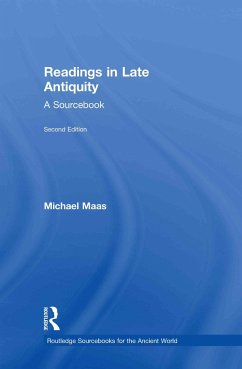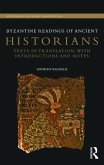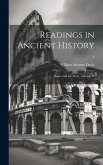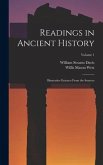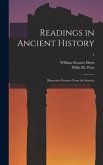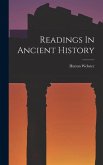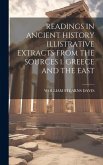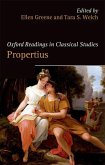Readings in Late Antiquity
A Sourcebook
Herausgeber: Maas, Michael
Readings in Late Antiquity
A Sourcebook
Herausgeber: Maas, Michael
- Gebundenes Buch
- Merkliste
- Auf die Merkliste
- Bewerten Bewerten
- Teilen
- Produkt teilen
- Produkterinnerung
- Produkterinnerung
This sourcebook illustrates the dramatic political, social and religious transformations of Late Antiquity through the words of the men and women who experienced them. Drawing from Greek, Latin, Syriac, Hebrew, Coptic, Persian, Arabic and Armenian sources, the carefully chosen passages illuminate the lives of emperors, abbesses, aristocrats, slaves, children, barbarian chieftains, and saints from the Roman Empire and its neighbours.
Andere Kunden interessierten sich auch für
![Byzantine Readings of Ancient Historians Byzantine Readings of Ancient Historians]() Anthony KaldellisByzantine Readings of Ancient Historians181,99 €
Anthony KaldellisByzantine Readings of Ancient Historians181,99 €![Readings in Ancient History: Rome and the West - Volume II; 2 Readings in Ancient History: Rome and the West - Volume II; 2]() William Stearns DavisReadings in Ancient History: Rome and the West - Volume II; 239,99 €
William Stearns DavisReadings in Ancient History: Rome and the West - Volume II; 239,99 €![Readings in Ancient History: Illustrative Extracts From the Sources; Volume 1 Readings in Ancient History: Illustrative Extracts From the Sources; Volume 1]() William Stearns DavisReadings in Ancient History: Illustrative Extracts From the Sources; Volume 138,99 €
William Stearns DavisReadings in Ancient History: Illustrative Extracts From the Sources; Volume 138,99 €![Readings in Ancient History: Illustrative Extracts From the Sources; 1 Readings in Ancient History: Illustrative Extracts From the Sources; 1]() William Stearns DavisReadings in Ancient History: Illustrative Extracts From the Sources; 138,99 €
William Stearns DavisReadings in Ancient History: Illustrative Extracts From the Sources; 138,99 €![Readings In Ancient History Readings In Ancient History]() Hutton WebsterReadings In Ancient History35,99 €
Hutton WebsterReadings In Ancient History35,99 €![Readings in Ancient History Illistrative Extracts from the Sources 1. Greece and the East Readings in Ancient History Illistrative Extracts from the Sources 1. Greece and the East]() Wolliam Stearns DavisReadings in Ancient History Illistrative Extracts from the Sources 1. Greece and the East36,99 €
Wolliam Stearns DavisReadings in Ancient History Illistrative Extracts from the Sources 1. Greece and the East36,99 €![Oxford Readings in Propertius Oxford Readings in Propertius]() Oxford Readings in Propertius252,99 €
Oxford Readings in Propertius252,99 €-
-
-
This sourcebook illustrates the dramatic political, social and religious transformations of Late Antiquity through the words of the men and women who experienced them. Drawing from Greek, Latin, Syriac, Hebrew, Coptic, Persian, Arabic and Armenian sources, the carefully chosen passages illuminate the lives of emperors, abbesses, aristocrats, slaves, children, barbarian chieftains, and saints from the Roman Empire and its neighbours.
Hinweis: Dieser Artikel kann nur an eine deutsche Lieferadresse ausgeliefert werden.
Hinweis: Dieser Artikel kann nur an eine deutsche Lieferadresse ausgeliefert werden.
Produktdetails
- Produktdetails
- Verlag: Taylor & Francis
- 2nd edition
- Seitenzahl: 528
- Erscheinungstermin: 10. Dezember 2009
- Englisch
- Abmessung: 236mm x 160mm x 36mm
- Gewicht: 930g
- ISBN-13: 9780415473361
- ISBN-10: 0415473365
- Artikelnr.: 27870158
- Herstellerkennzeichnung
- Libri GmbH
- Europaallee 1
- 36244 Bad Hersfeld
- gpsr@libri.de
- Verlag: Taylor & Francis
- 2nd edition
- Seitenzahl: 528
- Erscheinungstermin: 10. Dezember 2009
- Englisch
- Abmessung: 236mm x 160mm x 36mm
- Gewicht: 930g
- ISBN-13: 9780415473361
- ISBN-10: 0415473365
- Artikelnr.: 27870158
- Herstellerkennzeichnung
- Libri GmbH
- Europaallee 1
- 36244 Bad Hersfeld
- gpsr@libri.de
Michael Maas is Professor of History and Classical Studies at Rice University, USA, where he teaches ancient history. His research focuses on Late Antiquity. His most recent books are The Cambridge Companion to the Age of Justinian (2005) and Exegesis in the Early Byzantine Mediterranean (2003).
1. The Romans Empire 2. The Roman Army 3. Christianity 4. Polytheism 5. Jews 6. Domestic Life 7. Women 8. Law 9. Medicine 10. Philosophy 11. Persia 12. Germanic Invaders and Successor States 13. Steppe People Slavs 14. Islam New material in this edition includes: 1.2.1 The emperor comes to town Ammianus Marcellinus
History 16.10.5-10; Ammianus Marcellinus
22.2.3-5 1.2.9 The image of the emperor Theophilus
A Homily on the Virgin 1.3.11 A picture of the Roman Empire Eumenius
For the Restoration of the Schools .20 1.3.12 The condition and use of Roman roads Theodosian Code 15.3.4 1.3.13 Roman roads after Rome Cassiodorus
Variae XII.18 Gregory of Tours
The History of the Franks VI.11 1.4.3 The colossal wealth of aristocrats Olympiodorus of Thebes
Fragment 41.2 1.4.4 What to do with wealth? Anonymous
On Riches
6.3
20.1-2 1.4.5 Poverty Libanius
Oration
7.1-3 1.4.9 The great estates and the rise of patrons Theodosian Code 11.24.2 Code of Justinian II.54.1 1.4.10 Exploitation of peasant farmers in Syria and Egypt John Chrysostom
Homily in Matthew LXI.3 1.4.11 Dependence upon a landlord on an Egyptian estate Oxyrhynchus Papyrus 1.130
lines 1-10 1.4.15 Landlocked peasants Synesius
Epistles
148 2.3.8 Christian condemnation of games and public entertainments John Chrysostom
Homily on Matthew 37.6 2.3.11 Taking a bath Inscription of the Empress Eudocia Clement of Alexandria
Paedagogus 3.9 2.7.6 Christian Theory of Empire Paul the Silentiary
Description of Hagia Sophia 4.4.5 A bishop demands respect
even from an empress Philostorgius
Suda
A 254
Leontius 4.8.2 Extreme asceticism Canons of the Council of Gangra
343 4.11.2 Pope Gregory explains the Bible Pope Gregory I
Moralia 20.1.1 4.11.3 Teaching the Bible through paintings in church Paulinus of Nola
Carmina XXVII
512-595 5.2.2 Divination Sortes Sangallenses 6
14
54
57-60
88
106-7 5.2.11 Manichaeism Prayer of the Emanations CHAPTER 8 Domestic Life 9.3 Torture Augustine
City of God Against the Pagans
19.6 12.1.7 Julian's fatal invasion of Mesopotamia Ammianus Marcellinus
24.7.1 and 3-6 12.1.10 An Armenian obituary of Khusro Khusro's obituary 13.1.12 Theoderic's New World Order Cassiodorus
Variae III.3 Cassiodorus
Variae III.4 13.1.20 Venantius Fortunatus Poetry of Venantius Fortunatus 13.2.1 The origin of the Goths Jordanes
The Gothic History
4.25-29 13.2.2 Maintaining tribal identity Procopius
Wars
VII.ii.1-3 13.2.3 A view of the Franks from Constantinople Agathias
Histories
I.2.1; 1.2.3-4 13.2.4 What gives different peoples their distinguishing characteristics? Isidore of Seville
Etymologies 9.2.105 14.2.7 After Attila's death Jordanes
Getica L
261 = Priscus fr. 25 15.3.15 A Christian's explanation of Islam before the capture of Jerusalem Sophronius of Jerusalem
Sermon on the Epiphany
History 16.10.5-10; Ammianus Marcellinus
22.2.3-5 1.2.9 The image of the emperor Theophilus
A Homily on the Virgin 1.3.11 A picture of the Roman Empire Eumenius
For the Restoration of the Schools .20 1.3.12 The condition and use of Roman roads Theodosian Code 15.3.4 1.3.13 Roman roads after Rome Cassiodorus
Variae XII.18 Gregory of Tours
The History of the Franks VI.11 1.4.3 The colossal wealth of aristocrats Olympiodorus of Thebes
Fragment 41.2 1.4.4 What to do with wealth? Anonymous
On Riches
6.3
20.1-2 1.4.5 Poverty Libanius
Oration
7.1-3 1.4.9 The great estates and the rise of patrons Theodosian Code 11.24.2 Code of Justinian II.54.1 1.4.10 Exploitation of peasant farmers in Syria and Egypt John Chrysostom
Homily in Matthew LXI.3 1.4.11 Dependence upon a landlord on an Egyptian estate Oxyrhynchus Papyrus 1.130
lines 1-10 1.4.15 Landlocked peasants Synesius
Epistles
148 2.3.8 Christian condemnation of games and public entertainments John Chrysostom
Homily on Matthew 37.6 2.3.11 Taking a bath Inscription of the Empress Eudocia Clement of Alexandria
Paedagogus 3.9 2.7.6 Christian Theory of Empire Paul the Silentiary
Description of Hagia Sophia 4.4.5 A bishop demands respect
even from an empress Philostorgius
Suda
A 254
Leontius 4.8.2 Extreme asceticism Canons of the Council of Gangra
343 4.11.2 Pope Gregory explains the Bible Pope Gregory I
Moralia 20.1.1 4.11.3 Teaching the Bible through paintings in church Paulinus of Nola
Carmina XXVII
512-595 5.2.2 Divination Sortes Sangallenses 6
14
54
57-60
88
106-7 5.2.11 Manichaeism Prayer of the Emanations CHAPTER 8 Domestic Life 9.3 Torture Augustine
City of God Against the Pagans
19.6 12.1.7 Julian's fatal invasion of Mesopotamia Ammianus Marcellinus
24.7.1 and 3-6 12.1.10 An Armenian obituary of Khusro Khusro's obituary 13.1.12 Theoderic's New World Order Cassiodorus
Variae III.3 Cassiodorus
Variae III.4 13.1.20 Venantius Fortunatus Poetry of Venantius Fortunatus 13.2.1 The origin of the Goths Jordanes
The Gothic History
4.25-29 13.2.2 Maintaining tribal identity Procopius
Wars
VII.ii.1-3 13.2.3 A view of the Franks from Constantinople Agathias
Histories
I.2.1; 1.2.3-4 13.2.4 What gives different peoples their distinguishing characteristics? Isidore of Seville
Etymologies 9.2.105 14.2.7 After Attila's death Jordanes
Getica L
261 = Priscus fr. 25 15.3.15 A Christian's explanation of Islam before the capture of Jerusalem Sophronius of Jerusalem
Sermon on the Epiphany
1. The Romans Empire 2. The Roman Army 3. Christianity 4. Polytheism 5. Jews 6. Domestic Life 7. Women 8. Law 9. Medicine 10. Philosophy 11. Persia 12. Germanic Invaders and Successor States 13. Steppe People Slavs 14. Islam New material in this edition includes: 1.2.1 The emperor comes to town Ammianus Marcellinus
History 16.10.5-10; Ammianus Marcellinus
22.2.3-5 1.2.9 The image of the emperor Theophilus
A Homily on the Virgin 1.3.11 A picture of the Roman Empire Eumenius
For the Restoration of the Schools .20 1.3.12 The condition and use of Roman roads Theodosian Code 15.3.4 1.3.13 Roman roads after Rome Cassiodorus
Variae XII.18 Gregory of Tours
The History of the Franks VI.11 1.4.3 The colossal wealth of aristocrats Olympiodorus of Thebes
Fragment 41.2 1.4.4 What to do with wealth? Anonymous
On Riches
6.3
20.1-2 1.4.5 Poverty Libanius
Oration
7.1-3 1.4.9 The great estates and the rise of patrons Theodosian Code 11.24.2 Code of Justinian II.54.1 1.4.10 Exploitation of peasant farmers in Syria and Egypt John Chrysostom
Homily in Matthew LXI.3 1.4.11 Dependence upon a landlord on an Egyptian estate Oxyrhynchus Papyrus 1.130
lines 1-10 1.4.15 Landlocked peasants Synesius
Epistles
148 2.3.8 Christian condemnation of games and public entertainments John Chrysostom
Homily on Matthew 37.6 2.3.11 Taking a bath Inscription of the Empress Eudocia Clement of Alexandria
Paedagogus 3.9 2.7.6 Christian Theory of Empire Paul the Silentiary
Description of Hagia Sophia 4.4.5 A bishop demands respect
even from an empress Philostorgius
Suda
A 254
Leontius 4.8.2 Extreme asceticism Canons of the Council of Gangra
343 4.11.2 Pope Gregory explains the Bible Pope Gregory I
Moralia 20.1.1 4.11.3 Teaching the Bible through paintings in church Paulinus of Nola
Carmina XXVII
512-595 5.2.2 Divination Sortes Sangallenses 6
14
54
57-60
88
106-7 5.2.11 Manichaeism Prayer of the Emanations CHAPTER 8 Domestic Life 9.3 Torture Augustine
City of God Against the Pagans
19.6 12.1.7 Julian's fatal invasion of Mesopotamia Ammianus Marcellinus
24.7.1 and 3-6 12.1.10 An Armenian obituary of Khusro Khusro's obituary 13.1.12 Theoderic's New World Order Cassiodorus
Variae III.3 Cassiodorus
Variae III.4 13.1.20 Venantius Fortunatus Poetry of Venantius Fortunatus 13.2.1 The origin of the Goths Jordanes
The Gothic History
4.25-29 13.2.2 Maintaining tribal identity Procopius
Wars
VII.ii.1-3 13.2.3 A view of the Franks from Constantinople Agathias
Histories
I.2.1; 1.2.3-4 13.2.4 What gives different peoples their distinguishing characteristics? Isidore of Seville
Etymologies 9.2.105 14.2.7 After Attila's death Jordanes
Getica L
261 = Priscus fr. 25 15.3.15 A Christian's explanation of Islam before the capture of Jerusalem Sophronius of Jerusalem
Sermon on the Epiphany
History 16.10.5-10; Ammianus Marcellinus
22.2.3-5 1.2.9 The image of the emperor Theophilus
A Homily on the Virgin 1.3.11 A picture of the Roman Empire Eumenius
For the Restoration of the Schools .20 1.3.12 The condition and use of Roman roads Theodosian Code 15.3.4 1.3.13 Roman roads after Rome Cassiodorus
Variae XII.18 Gregory of Tours
The History of the Franks VI.11 1.4.3 The colossal wealth of aristocrats Olympiodorus of Thebes
Fragment 41.2 1.4.4 What to do with wealth? Anonymous
On Riches
6.3
20.1-2 1.4.5 Poverty Libanius
Oration
7.1-3 1.4.9 The great estates and the rise of patrons Theodosian Code 11.24.2 Code of Justinian II.54.1 1.4.10 Exploitation of peasant farmers in Syria and Egypt John Chrysostom
Homily in Matthew LXI.3 1.4.11 Dependence upon a landlord on an Egyptian estate Oxyrhynchus Papyrus 1.130
lines 1-10 1.4.15 Landlocked peasants Synesius
Epistles
148 2.3.8 Christian condemnation of games and public entertainments John Chrysostom
Homily on Matthew 37.6 2.3.11 Taking a bath Inscription of the Empress Eudocia Clement of Alexandria
Paedagogus 3.9 2.7.6 Christian Theory of Empire Paul the Silentiary
Description of Hagia Sophia 4.4.5 A bishop demands respect
even from an empress Philostorgius
Suda
A 254
Leontius 4.8.2 Extreme asceticism Canons of the Council of Gangra
343 4.11.2 Pope Gregory explains the Bible Pope Gregory I
Moralia 20.1.1 4.11.3 Teaching the Bible through paintings in church Paulinus of Nola
Carmina XXVII
512-595 5.2.2 Divination Sortes Sangallenses 6
14
54
57-60
88
106-7 5.2.11 Manichaeism Prayer of the Emanations CHAPTER 8 Domestic Life 9.3 Torture Augustine
City of God Against the Pagans
19.6 12.1.7 Julian's fatal invasion of Mesopotamia Ammianus Marcellinus
24.7.1 and 3-6 12.1.10 An Armenian obituary of Khusro Khusro's obituary 13.1.12 Theoderic's New World Order Cassiodorus
Variae III.3 Cassiodorus
Variae III.4 13.1.20 Venantius Fortunatus Poetry of Venantius Fortunatus 13.2.1 The origin of the Goths Jordanes
The Gothic History
4.25-29 13.2.2 Maintaining tribal identity Procopius
Wars
VII.ii.1-3 13.2.3 A view of the Franks from Constantinople Agathias
Histories
I.2.1; 1.2.3-4 13.2.4 What gives different peoples their distinguishing characteristics? Isidore of Seville
Etymologies 9.2.105 14.2.7 After Attila's death Jordanes
Getica L
261 = Priscus fr. 25 15.3.15 A Christian's explanation of Islam before the capture of Jerusalem Sophronius of Jerusalem
Sermon on the Epiphany

